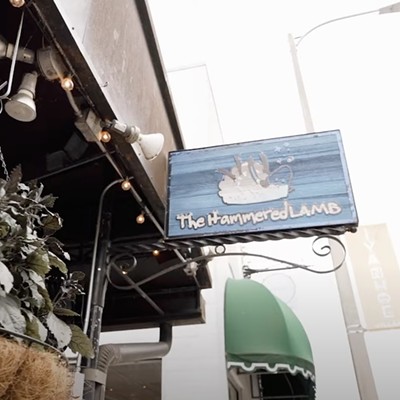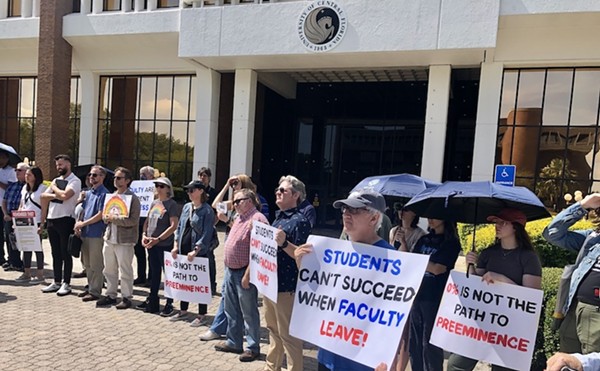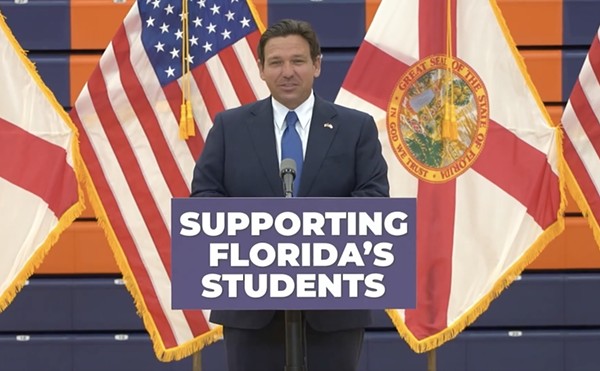On Jan. 21, more than 30 hooded Orlando Police Department officers and agents of the state Division of Alcoholic Beverages and Tobacco descended on 414 Liquors to conduct a search warrant at the 50-year-old Parramore Avenue tavern.
For the most part, the operation looked routine. In this case, the two bar owners -- a 42-year-old Korean immigrant named Yong Han Lee and his wife, Sak Soon, 42 -- stood accused of the relatively mundane crime of allegedly buying and selling (supposedly) stolen cigarettes.
Yet many people had anticipated the Lees' demise -- not because they were bad people, but because they knew how badly the city wanted the property the Lees owned.
As far back as last November, when the state agency began the two-month investigation that produced the search warrant, the city was passing around maps showing that 414 Liquors would likely be rezoned into a park. Again in August, maps showed that 414 Liquors was one of six "future property acquisitions" the city had planned for Federal Street, which runs adjacent to the lounge.
More important to bar's fate, however, is the charter school that the city has been fighting to establish near Parramore Avenue and Livingston Street -- about 150 yards from 414 Liquors.
School-board officials tentatively approved that school in May, overcoming their nervousness about the liquor store's proximity. That nervousness was heightened by anecdotal evidence that crack sales were occurring near the Lees' business. "If the 414 bar is still open, that sets a precedent for [the school district], which then will be used against us when we protest others asking for a liquor license near one of our schools," said Linda Sutherland, a school-board member, at that May meeting. "That's a big issue for me. That's not been addressed at all."
The city's intentions were reiterated when Daisy Lynum, a city commissioner whose district includes Parramore, made a Freudian slip and said the city already had acquired the property -- though the Lees were still very much in possession of their bar. "The site at 414, the city has purchased that," Lynum told school-board members April 25.
To many observers, that slip, along with what some describe as a pattern of harassment by Orlando police, makes the Asian Americans' arrest seem politically motivated and leaves little doubt that they were entrapped, a defense the Lees' criminal attorneys plan to use at their trial in November. Especially considering the fact that the Lees, who have owned the bar for eight years, have no prior criminal history.
"The crime wasn't any worse [at 414] than anywhere else in Parramore," says Sylvia Young, a neighborhood activist. Young fought unsuccessfully to prevent the city from closing Crossroads Mission, a homeless shelter located one block south of 414 that was condemned last fall. "If 414 was that bad, with all those drug sales and arrests," Young continues, "why couldn't OPD acknowledge that at the school-board meeting?"
City and OPD officials deny that the handling of 414 has been anything but "above-board," in the words of Police Chief Jerry Demings.
However, at least one city commissioner, Ernest Page, feels that the actions taken against the Lees have been "onerous and overreaching." Page has written city leaders a memo saying the city needs to back off its allegations until a meeting can be held to "deal with the problems surrounding this store."
"The way the city went about this thing while they were negotiating to buy the property does not look good," Page says.
After the Lees' January arrest, 414 Liquors was hit with 16 code-enforcement violations and a nuisance-abatement action. Nuisance abatement is a process that governments use to shut down businesses that they believe condone drug sales, prostitution or gang activity.
Corrections of the code violations, which ranged from exposed wires to an uncapped sewer line to unmarked handicapped parking spots, were approved on Sept. 14. The nuisance-abatement action is pending. The Lees also face a state administrative action that will try to take away their liquor license.
The apparently sudden burst of interest in 414 Liquors did not occur without some slight warning.
The city's scrutiny of 414 actually dates as far back as January 1999. At that time, the city sent the Lees a letter saying police had busted Levada Ross for dealing cocaine at the bar. OPD threatened, as is the custom with such letters, to make the Lees forfeit their bar if Ross was caught dealing drugs on the property again.
The Lees ignored the letter as well as three others police sent during the next six months. Each letter referred to other crack dealing at 414.
But police officials didn't appear to be motivated to file any other paperwork against the Lees until the state Division of Alcoholic Beverages and Tobacco (ABT) began its investigation.
Nicholas Collura, an ABT agent, spent several months undercover inside the lounge, allegedly offering to sell Marlboro and Newport cigarettes to the Lees for $8 a carton. Posing as an employee of a trucking company, Collura told the Lees that he had stolen untaxed cigarettes from a warehouse.
In a deposition, Collura paints the Lees as something other than innocent immigrants who came to America, taught themselves English and created a successful business. (The Lees also own a grocery in Winter Garden.)
Sak Soon Lee, whom 414 patrons called "mama," was a nervous but willing conspirator in the black-market cigarette business who silently witnessed gambling and drug trafficking in the bar, Collura alleges.
Her husband, meanwhile, was bold and cunning, allegedly buying two cartons of Newports the first time the agent approached him in the 414's parking lot, Collura said.
At one point, according to Collura's deposition, Yong Han Lee allegedly threatened the undercover agent: "If I find out you're a cop, I'll blow your head off." Agents have entered into evidence Yong Han Lee's Glock handgun.
For the two-and-a-half months Collura began frequenting the bar, drinking beer and carrying cartons of cigarettes in brown paper bags, he recorded 34 counts of alleged crack and pot sales in the bar.
The investigation, however, didn't originate with Collura. According to Collura's deposition, another agent, Don Palmer, suggested that Collura look into 414. Palmer is a former community watch officer with OPD.
Was Palmer prompted by OPD to guide Collura to 414?
No, Palmer says. "There was no agenda. There was no direction from the city."
In his deposition, Agent Collura says the investigation was begun after a confidential paid informant -- a snitch -- told investigators that patrons, employees and management were dealing drugs at 414. The snitch even said the Lees were taking money from drug dealers to look the other way when crack sales occurred in the bar.
The Lees' criminal attorney, Adam Reiss, asked Collura if he was ever able to confirm that last allegation.
"No, I was not," Collura responded.
Several days after Collura first began investigating the bar, the snitch allegedly told him the Lees might buy untaxed cigarettes.
But that raises another issue: Since the informant's earlier tip couldn't be proven, it casts doubt about the trustworthiness of the snitch. Without a reliable informant, ABT agents wouldn't have had probable cause to investigate the Lees, infringing upon their Fourth Amendment rights against illegal searches and seizures.
Palmer, though, denies the ABT went fishing at 414. Rather, agents responded as they would to any suggestion that a crime is being committed, he says. "We would have walked away if we saw no criminal activity," he says.
(Adam Reiss, the Lees' attorney, and the Lees declined to be interviewed for this article.)
While the 34 alleged drug sales that Collura counted won't be used against the Lees in criminal court, it is the city's primary complaint in the nuisance-abatement process.
That process was launched on June 6 -- just weeks after the most recent school board discussion on the Parramore charter school.OPD undercover officers documented 25 cases of crack sales near the phone booths and in the parking lot of 414. But Capt. Robert Gregory, in his memo seeking the nuisance-abatement action, chose to cite Agent Collura's two-month investigation instead -- even though the ABT's sting was completed more than four months prior to Gregory's memo.
Moreover, when he appeared at a Sept. 12 nuisance-abatement hearing, Gregory curiously offered -- unsolicited -- that 414 had not been singled out by the city. "We had no direction from anyone," he told board members. "We were responding to drug complaints in the area."
Of course, Yong Han Lee could have chosen to argue his case; instead, he threw up the white flag. His attorney, Dean Cannon, announced at the hearing that Lee had signed an agreement to close the bar, refusing to contest the allegation of more than 40 crack sales on his property. The agreement gives Lee 90 days to sell his inventory and shut down. It gives the city authority to veto any new business the Lees might want to open at 414 N. Parramore. And it requires the Lees to hire OPD officers to patrol the business until it closes.
The strange part is that Sak Soon Lee declined to sign the agreement, leaving the stipulation about those drug sales in limbo. (City attorney Scott Gabrielson says he thinks the agreement is valid with only one signature.)
Thus, the city could own 414 at the end of three months. According to one source, the city has already offered $475,000 for the site -- or $275,000 more than the Lees paid for their bar in 1994.
Cannon, the Lees' attorney, doesn't deny the Lees would be interested in selling to the city. "I am planning to investigate possible negotiations," he says.
Cannon, incidentally, isn't convinced there's any conspiracy to acquire 414. He sees the Lees' plight as a situation of bureaucratic confusion, where the right hand of the city didn't know what the left hand was doing. "It's ironic that there appears to be a connection between the nuisance-abatement board and the city's desire to own the property," he says. "But I don't think there is."
In any case, the end of 414 location as a bar and liquor store doesn't guarantee final approval for the charter school, which the school board will consider in November. The final say could fall to the local branch of the NAACP, which won a school desegregation order dating to 1972.
Though a chapter vice president endorsed the proposal in May, the branch as a whole has not taken a position on placing the school in the predominantly black neighborhood. "We will have input in that decision," says branch president Thomas Alston.

















